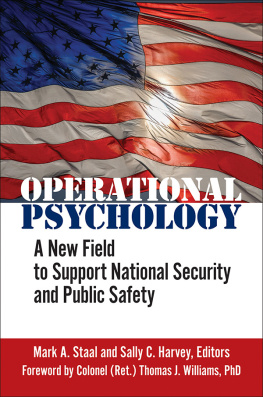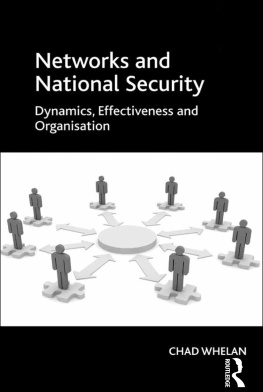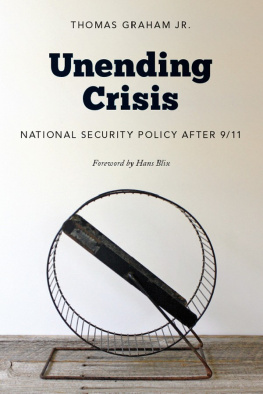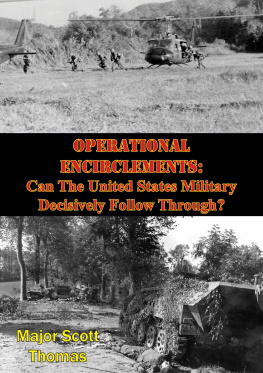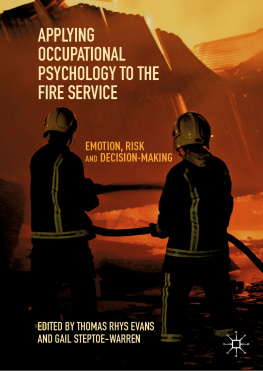Mark A. Staal and Sally C. Harvey, Editors
All rights reserved. No part of this publication may be reproduced, stored in a retrieval system, or transmitted, in any form or by any means, electronic, mechanical, photocopying, recording, or otherwise, except for the inclusion of brief quotations in a review, without prior permission in writing from the publisher.
This book is also available as an eBook.
To the souls who serve our nation and public safety, in the open when they can, and in the shadows when they must.
Contents
Colonel (Ret) Thomas J. Williams, PhD
Mark A. Staal and Sally C. Harvey
Mark A. Staal and Brendon Bluestein
Mark A. Staal and Sally C. Harvey
Barbara Thompson, Chad E. Morrow, and Mark A. Staal
Sally C. Harvey
Mark A. Staal
Shawnna Chee and Mark A. Staal
Christopher Myers and Amanda Trent
Heather L. Morris and David G. Ray
Daniel J. Neller
Mark A. Staal
Susan E. Brandon, Joeanna C. Arthur, David G. Ray, Christian A. Meissner, Steven M. Kleinman, Melissa B. Russano, and Simon Wells
Susan E. Brandon, Steven M. Kleinman, and Joeanna C. Arthur
Mark A. Staal and Christopher Myers
Mark A. Staal and Sally C. Harvey
This book offers a tour de force on the profound contributions of operational psychology, bringing forth with clarity, context, and vision how psychologists help fulfill their obligations in supporting national security and public safety. At its core, this timely and authoritative book rests upon the foundation of actions taken just prior to World War I that helped establish the very profession of psychology as a sciencepsychologys contributions to support national security in times of war. This support provided early psychologists the opportunity to demonstrate the importance of the science of psychology. It also demonstrated that psychologists of that age were fully aware of, and committed to, the full expression of their professional and scientific responsibilities to society.
We are indeed fortunate that the two editors of this book, Mark Staal and Sally Harvey, both of whom have been unparalleled in their leadership to advance (and frequently defend) operational psychology within our profession, are leading this effort. They have tirelessly represented both our profession and our society. Their leadership, actions, and service are repeatedly made evident through their scholarship, dedication, and sacrifice in helping the profession of psychology realize the full expression of its responsibilities to society. Within this important contribution, Sally and Mark have assembled a number of operational psychology science-practitioners who help them bring forth and give expression to the full scope, breadth, and depth of what operational psychologists contribute to society through their professional practice and service. It is within this broad scope for the application of psychology to real-life threats, and in recognition of the opportunity to provide direct, overall benefits to the welfare of our society, that operational psychologists find themselves drawn to such service. Few practice areas are more challenging; and perhaps none are as rewarding! At times, and of necessity, that reward is in knowing what was avoided (e.g., lives were saved, disasters averted, threats to society reduced). At other times, the efforts are focused on those who defend us against threats (e.g., via assessment and selection, suitability screening, cross-cultural training, consultations). Perhaps an even greater reward is when psychologists who provide support to national security quickly realize how leveraging the science of psychology helps them bring forth and leverage knowledge in protecting our values and our citizens. It might be said that operational psychologists confront the reality of how the world really is: avoiding the illusions of the shadows on the cave wall by using their professional expertise to see the real causes of the shadows that pose risks to all of society. This reality and this dedication to learn from all specialty areas within the profession to help reduce risks to our society is what ensures operational psychology does not lose its foundational grasp on the reality (and need) to protect and advance the interests of both our profession and our society.
To fully appreciate and achieve these expressed aspirations and interests of our profession, we must ensure we are able to dislodge the opposition to operational psychology from within our profession. The most vocal and frequent of this opposition is too often thinly veiled in the shadows of distorted, disingenuous, and discredited diatribes that serve to distort the knowledge and facts, undermining trust both within and for our profession.
It is that threat, to both our profession and the society it serves, that reinforces the extreme importance of this compilation of chapters that present us with the wisdom and experience of operational psychologists. It has been said that knowledge begins with trust, helping us move past traditional biases and prejudices. The chapters within this extraordinarily valuable edited volume bring forth that knowledge. Importantly, the volume also builds upon the foundation of the responsibility that helps instill trust in our professions ability to advance both the science and service that Robert Yerkes set in motion that helped establish psychology as a science.
Mark and Sally now build upon Yerkess legacy, linking service and the science of psychology by setting forth : Foundations of Operational Psychology. They address the history and evolution of operational psychology, and its applications within the context of both cross-cultural competence and the ethics debate that forced self-reflection upon the profession and its members.
Operational psychologists also readily embrace and engage in the challenge of confronting and mitigating threats to national security. These areas coalesce around Human Performance Optimization and Consultation (, the editors bring forth chapters on Consultation to Operations, with these chapters addressing some of the most often misunderstood, but critical, aspects of operational psychology. In consultations to operations, operational psychologists help to ensure the validity and reliability of assessments in criminal investigations; they complete assessments of insider threats; and they help plan, participate in, and provide oversight to the training and operational activities associated with one of the most controversial areas within operational psychology: interrogation support. The final section addresses indirect assessments, which, in application, are very much aligned to consultation reviews.

